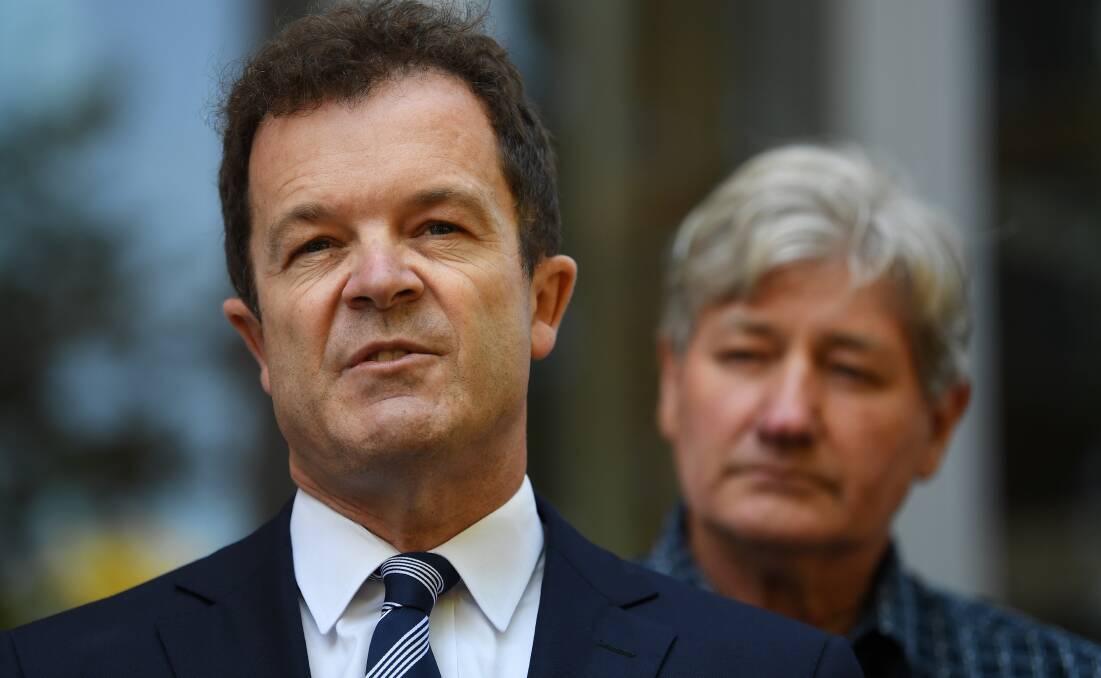
NSW Attorney-General Mark Speakman said institutions need to join the National Redress Scheme for child sexual abuse survivors without further delay as a range of new laws to bring offenders to justice come into effect in NSW today.
Subscribe now for unlimited access.
$0/
(min cost $0)
or signup to continue reading
Mr Speakman said the NSW Government, which was the first Australian state to pass legislation to join the scheme, had acted swiftly and in the best interests of NSW survivors.
Institutions that have still not signed up formally to the Redress Scheme should do so now without further delay so that survivors can access the recognition their ordeals demand, he said.
A recent Senate hearing in Newcastle on the scheme heard evidence from a Hunter woman, Mary, 96, who is almost certainly the oldest Australian to seek redress under the scheme after she lodged an application in July. But her application for compensation after being sexually abused at a Sydney Catholic orphanage is on hold because the Catholic Church has so far not joined the scheme.
The National Redress Scheme said institutions run by the South Australian and Western Australian governments, the Catholic, Anglican and Uniting churches, and some state and territory members of Scouts Australia had committed to join the scheme but had steps to go before fully participating.
The Senate hearing heard evidence from abuse survivors devastated at delays by institutions which have two years to join the scheme.
Mr Speakman said new laws coming into force today, which represent one of the largest overhauls of child sexual abuse legislation, would increase child protection, bring offenders to justice and deliver better outcomes for survivors.
The new laws include a new grooming offence and laws to make it easier to prosecute persistent child sexual abuse.
The NSW Government is putting the safety of children front and centre and fixing shortcomings in the law identified by the Royal Commission into Institutional Responses to Child Sexual Abuse, Mr Speakman said.

From today it is an offence to groom a parent or a carer to access a child for sexual purposes, after distressing evidence to the royal commission about offenders gaining access to children by establishing relationships with parents and carers.
The changes recognise sexual predators sometimes provide adults with gifts, money and other benefits as a way of cultivating their trust and gaining access to their children. Those found guilty of this new offence will face a maximum penalty of six years imprisonment, Mr Speakman said.
An existing offence of grooming children has also been broadened to cover situations where a victim is provided with money or other material benefits. In the past the grooming offence has only applied in situations where a child was given alcohol, drugs or indecent material, such as pornography.
The reforms also address difficulties proving the offence of persistent sexual abuse of a child, and increase the maximum penalty for the offence from 25 years to life imprisonment.
The prosecution will now only need to prove a defendant engaged in two or more unlawful sexual acts with a person under 16 over a specific period of time, Mr Speakman said.
Institutions that have still not signed up formally to the Redress Scheme should do so now without further delay so that survivors can access the recognition their ordeals demand.
- NSW Attorney-General Mark Speakman.
Previously courts often required significant details about each individual incident, which could be difficult for victims to recall particularly when the incidents occurred many years ago and were persistent.
Judges will now have the power in child sexual abuse cases to give the jury information about how trauma can affect a persons memory, where a complainant has given differing accounts of abuse.
Courts sentencing an offender for historical child sexual abuse cases will no longer be able to take the persons good character into account as a mitigating factor if that good character assisted them to commit the offence.
Other reforms taking effect today include renaming the offences of indecent assault and act of indecency as sexual touching and sexual act; ensuring simplified offences and terminology and the introduction of a new offence of sexual touching within a special care relationship, which will protect children aged 16 and 17 from inappropriate sexual contact with teachers, health professionals, authorised carers and others who have special care of the child.
NSW laws will now include a similar age defence that may apply when a defendant engages in consensual sexual activity with a peer who is at least 14 years old, and the age difference between them is not more than two years.
They will also include a limited sexting defence to reduce the risk that children engaging in consensual sexting in certain circumstances will be criminalised for making, possessing and distributing child pornography.
These reforms build on changes the Government has already made in response to the Royal Commission, including the establishment of an offence of failing to report child abuse which attracts a maximum sentence of five years imprisonment, or seven years when done for a personal benefit, Mr Speakman said.
NSW has led the nation in its response to the Royal Commission, accepting the majority of its criminal justice recommendations and changing the civil justice system to be fairer to survivors by removing a technical legal defence which prevented institutions governed by trust arrangements from being sued.

